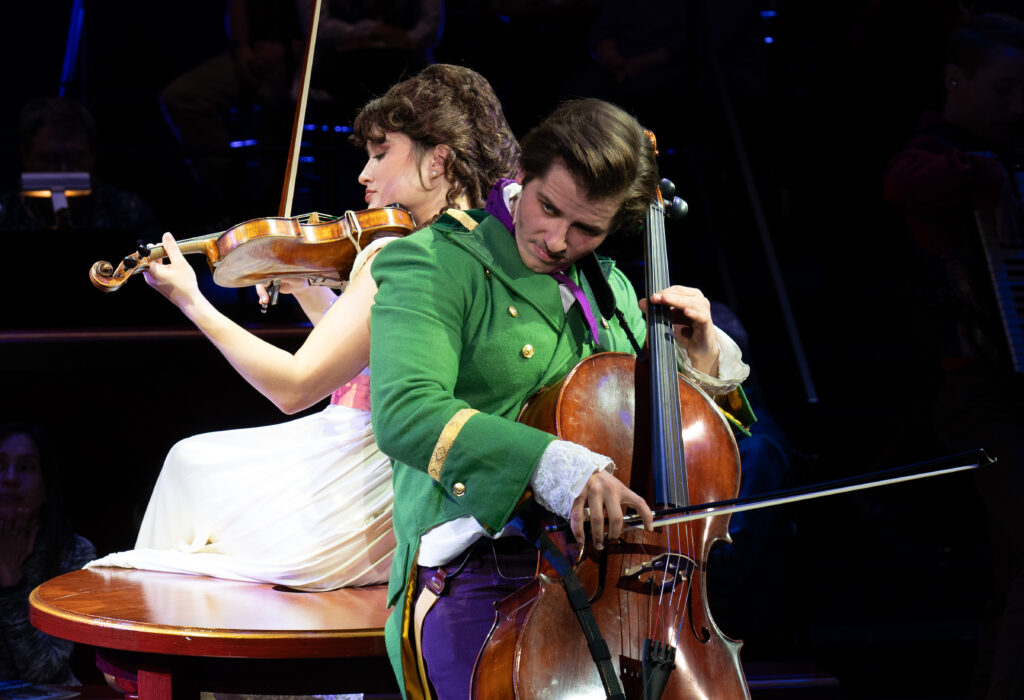This electropop opera, which was first performed in 2012 (written by Dave Malloy) evoked distinctly divided opinions along the audience members. One told me he really wanted to leave at the intermission, but was compelled to stay with his companion for the evening. I thought it was delightfully vibrant and a totally impressive one that utilized every portion of the Zach Theatre here in Austin for a 360-degree immersive experience.

To give the full title, this is Natasha, Pierre & The Great Comet of 1812. It is an adaptation of a segment from Tolstoy’s 1869 novel War and Peace, and while it has a thoroughly Russian character, the music has elements of electronic dance music and indie rock. This production is directed by David Steakley, who writes of his first time with the production in a tent in Manhattan ten years ago. “The originality of Molloy’s compositions was like nothing I had ever experienced, brought to thrilling life while actors, dancers, violin and accordion players and guitarists swirled around me.” A 2016 review in The Guardian newspaper of the Broadway production put it best, describing the musical style as a “shot of horseradish vodka.”
Like the Broadway show, this one includes audience seats right on the stage, and some people actually joined in on one particularly frenetic dance number. If you have never experienced a truly immersive musical production, that alone makes it a worthwhile reason to buy a ticket, even if you don’t want to dance on stage!
Within this musical, which I have already stated is an opera, is yet another opera. It is in fact a ‘grotesque opera’ that is witnessed by the characters. In the 19th century many aristocrats attended the opera to see and be seen by others, not so much transfixed by the action on stage. Ladies would often train their opera glasses not on the stage, but on the best-looking young men. As this play is set in 1812, when Napoleon invaded Russia, there was no lack of men in uniform to gaze it.
Here we have Andrey (played by Hayden Stanes, a 6-foot 4 Australian), who fits the bill perfectly. Only the spoiled Natasha (Kelly Belarmino), who is betrothed to the ideal hunk, would have the audacity to disgrace her family by breaking with Andrey for the smarmy yet devilishly-handsome Anatole (played with reckless abandon by Jackson Mattek). For all its splash and thunder, this production is really the story of a love triangle, Russian-style. Belarmino, the centre of all this, does a superb job as the unwitting Jezebel here (I say unwitting as Natasha is not really bright enough to merit the highest put-down of being termed Jezebel). But her character as the coquettish fool is sufficient warning as to what damage can be done to the lives of men who fall for looks and wealth instead of brains and character.
The lead character of Pierre is played by Ryan Everett Wood with all the depth the character demands. As an older man, one would expect him to exude gravitas as the other young ones go about ruining their lives in love and war, and this is exactly what we get. One quote from him will suffice: “They say we are asleep until we fall in love. I’m ready to wake up.” Regular attendees of Zach productions will remember his superb role as Bob Cratchit in A Christmas Carol in 2023. The supporting cast do a truly great job here, ramping up the noise and the action to the highest possible pitch.

As an astronomer, I was looking forward to a production that prominently proclaimed “The Great Comet of 1812” in its title. As it is only mentioned at the very end of the play, in a way that seems quite forced, it was nothing but a damp squib. As for those who want to be historically accurate, there was a Great comet in 1811, but by 1812 it was hardly visible anymore.
An unusual delight, I highly recommend seeing Natasha, Pierre & The Great Comet of 1812 before it ends on March 3.
Photos: Lead photo: Hayden Stanes
Second photo: Ryan Everett Wood takes centre-stage
Third photo: Kelly Belarmino in an intimate duet with Jackson Mattek
Photo credit: Suzanne Cordeiro
Tickets at: www.zachtheatre.org
